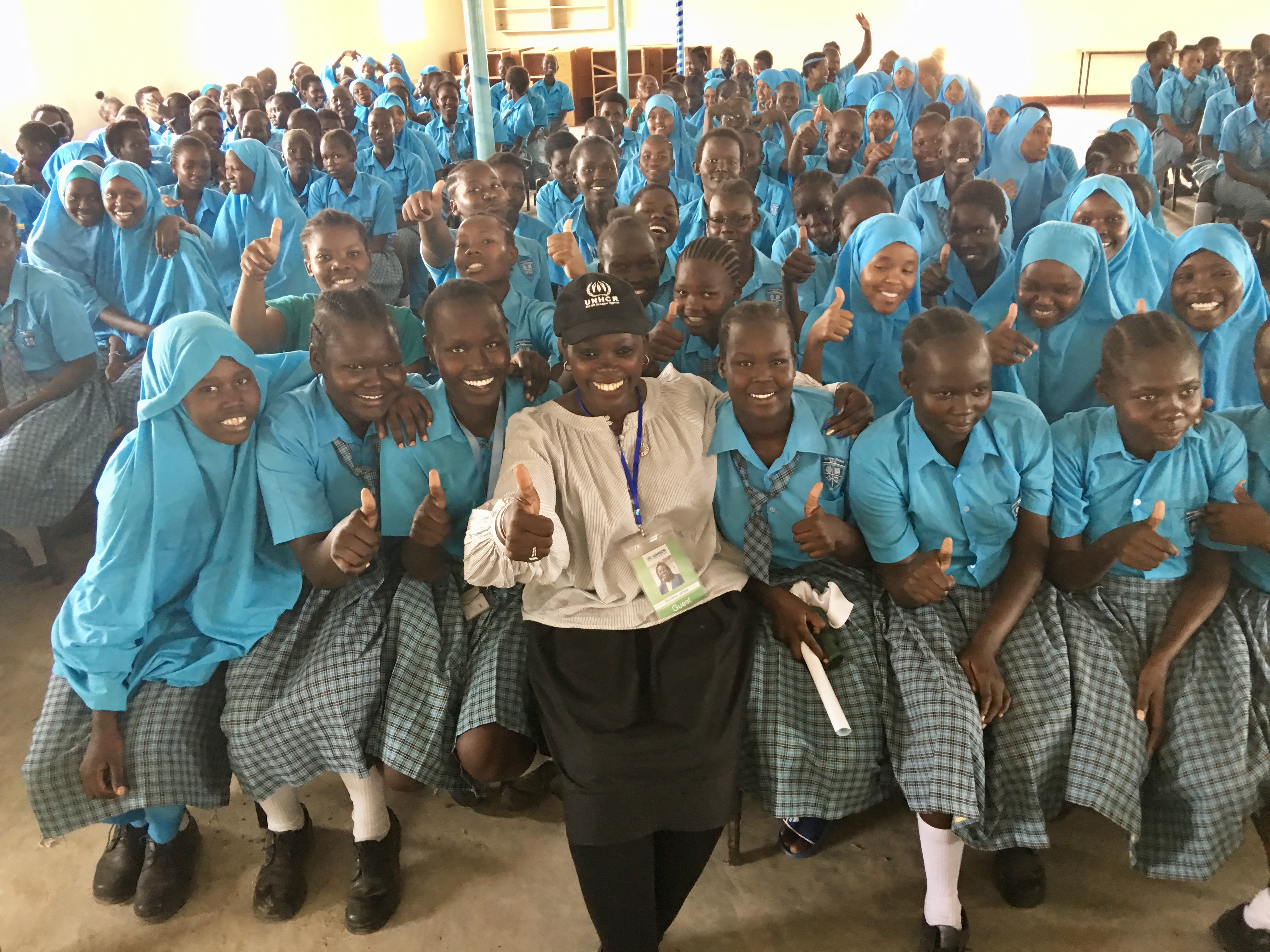Mariéme Jamme, who received no education until she was 16, is now a technology entrepreneur with a mission to train young women.

Mariéme Jamme, a World Economic Forum’s Young Global Leader, guides computer students in Kakuma camp. © UNHCR/Rose Ogola
© Technology expert Mariéme Jamme bends over a computer screen to guide a student at a training centre in Kenya’s Kakuma refugee camp. She knows just how important help can be for these youngsters.
Mariéme is one of 16 World Economic Forum Young Global Leaders (YGLs) on a visit to Kakuma, and the Kalobeyei settlement in north-western Kenya, to meet refugees and host communities.
The YGLs were divided into seven groups according to their expertise and interest. Mariéme was part of the education team.
“I chose this group so that I can encourage young people to focus on education,” she says. “Education opens doors and a whole new world to people.”
Kakuma and its neighbouring town have a combined population of nearly 250,000, refugees and local people.
A Senegalese-born technology entrepreneur, now based in the United Kingdom, she was abandoned by her mother and grew up in an orphanage in Senegal before being trafficked to France.
There she befriended a Moroccan woman who became her mentor and encouraged her to apply for a migration programme to go to the UK, where she has lived since she was 19.
Mariéme, now 44, received no formal education. At the age of 16 she taught herself to read and write.
“I went to the library every day.”
“I went to the library every day,” says Mariéme. “Then I read every material that came my way. I have now registered to sit GCSE and A level exams next year.”
One of the institutions the team visited was the Kakuma Campus of Masinde Muliro University where Mariéme met Rose Chelia, a refugee from South Sudan. Rose told her how she fled to Kakuma with her aunt but was unable to go to school immediately.
“I started school in one of the day schools in Kakuma and in 2005 got a scholarship to one of the top boarding schools at the camp,” she said. “My aunt was unhappy because she wanted me to take care of my young cousins and we became estranged for a long time.
“Due to the stress, I did not perform very well at the end of primary school and had to walk from school to school for three months before I found a high school that would admit me.
“Mariéme’s story gives me hope that, in spite of difficulties, our destiny is in our hands and we should seize all opportunities that come our way.”

Mariéme Jamme, a World Economic Forum Young Global Leader with students at Morneau Shepell Secondary School in Kakuma. © UNHCR/Rose Ogola
Last year, Mariéme was presented with the Innovation Award at the Global Goals Awards 2017 by UNICEF and the Bill and Melinda Gates Foundation for her work in advancing the United Nations Sustainable Development Goals.
She was also named in the Powerlist 2017 of Britain’s 100 most influential people of African and African Caribbean Heritage and honoured as a YGL by the World Economic Forum in 2013.
“I understand the difficulties and pain they have been through.”
She told UNHCR some of the harrowing details of her story.
“I was raped as a child, I was beaten as a child, and I was trafficked to France at the age of 13 and forced into prostitution,” she said.
“I lived in a tube station in Paris for three years before I was picked up by the police and put in a rescue centre. Because of this, I am able to connect with the refugees and understand the difficulties and pain that most of them have been through.”
She is the founder of an initiative known as iamtheCODE, whose goal is to teach girls in marginalized communities computer coding, provide them with a safe educational space and help them find jobs. Her mission is to train 1 million women and girl coders by 2030.
At the end of their five-day visit, the YGLs discussed what they had learned and proposed solutions. These included the creation of a hub that would link refugees and the host communities to public and private partnerships via a network of YGLs.
Like her fellow visitors, Mariéme left Kenya feeling hopeful about the future.
She said she believed Kakuma would be part of her iamtheCODE initiative.
“I commit to working with UNHCR to establish technology hubs in Kakuma and teach coding to young women and girls in both the refugee and host communities.”
Share on Facebook Share on Twitter